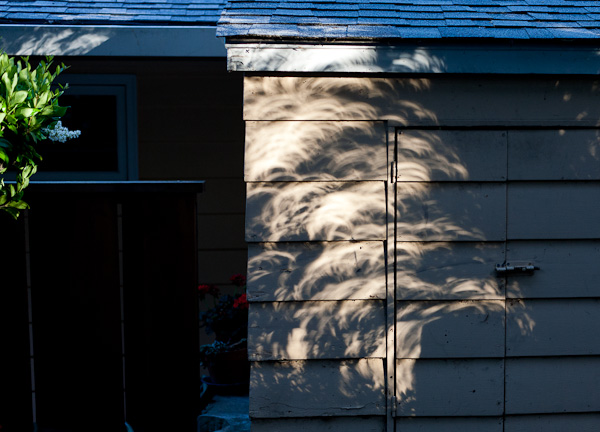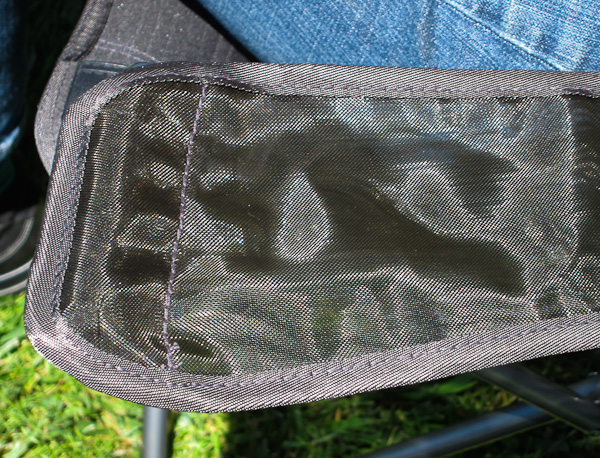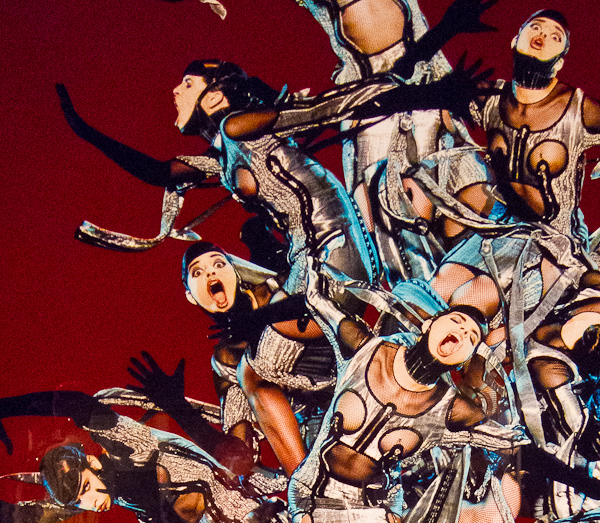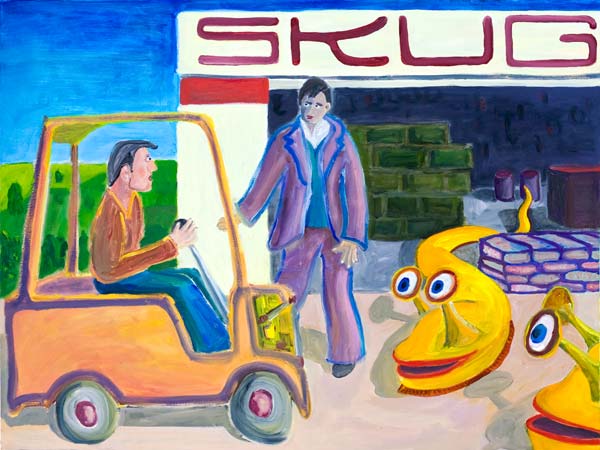There was a cool partial annular eclipse of the sun here in the SF Bay Area last week. It was about 6:30 pm, and the sun was going behind the hill that I live on, so I walked up the street to get a better view. I’d been using the safe method of studying tiny crescents via a pin hole punched sheet of paper projecting them onto a black back of a book. But, wearing shades and walking up the tree-crowned hill, I could suddenly see the eclipsed sun directly with my naked eyes.

And, yes, I know you’re not supposed to stare at it, and I didn’t. But I could see it, via quick, raking side-long glances, the suddenly huge-seeming sun a strange crescent just above the horizon, filtered through the scrim of live-oak trees, archaic, mythical, the horned sun.

The patches of shadow-light cast by the trees and bushes were strangely warped, with each dapple-blog cast into a crescent, with an overall effect like taffy.
It felt like a weird sign, a signal from on high.

Moving on, this is strange time in my chosen field of writing and publishing.
Firstly, it seems like there’s hardly any bookstores anymore. The big chains like Walden, Borders and B&N forced out the older small independent bookstores. Then Amazon ate the business of the chains. And now it seems like Barnes and Noble is the only chain left. So far as I know, the only generalized bookstores fair city of San Jose (urban area population of two million) are three Barnes and Noble outlets. Yes, we have a few textbook, foreign language, Christian, children’s, and used book stores too. But those aren’t stores that would stock any books I would write. Even in San Francisco there’s weirdly few bookstores—none at all near Union Square anymore: Borders, Rizzoli, Cody’s have all vanished. Nothing left to do but “shop.”

[A collage of photos of a model in a Jean Paul Gaultier “ant-dress,” on display at the show of his fashion currently running at the DeYoung Museum in SF.]
Secondly, the publishers seem to be on the skids, at least for me. The once-welcoming Tor Books published eight of my books from 1999 – 2011. But now they’re telling me they can’t afford to publish me anymore. My old fall-back publisher Four Walls Eight Windows was bought out by Avalon, who were bought out by Perseus, and their line of books has been essentially closed down. My new fall-back publisher Night Shade Books took six months to pay me my on-publication advance for my last novel, Jim and the Flims, and who knows when they’ll put out a trade pb edition. Night Shade’s finances are so shaky that they don’t want to buy my new books either.
I think publishers are looking more for the narrow, hard-core genre kinds of things. And that’s never been my style – even when I think I’m going that route. Really, Jim and the Flims was meant to come across as supernatural fantasy, but it hasn’t gotten the traction I’d hoped.
Thirdly, ebooks are starting to matter. One of the complicating things here is that the big publishers have been so greedy about the ebooks. For one thing, they’ve been keeping the prices of ebooks artificially high—I mean, come on, all you’re selling with an ebook is an electronic file. For another, they’ve been offering their authors an unfairly low cut of the ebook profits. It’s hard to even figure out what the publisher’s offer is for many of my books that have been ebook-ified, but these days the standard seems to be 25% of whatever money the publishers actually get. A lot of authors’ think they should be betting 50% or even 75% (which is typical for foreign book sales). See this impassioned rant by thriller-author Joe Konrath.

[Typical New Yorker ice-floe cartoon I found reprinted by the Native American site Blue Corn Comics as an example of ethnic stereotyping which, come to think of it, it is. By the way, in 2012, the cartoon would be closer to current trends if the “benefits” fish were a skeleton!]
So, fourthly, I have an ongoing fear of losing all my publishers. There’s a folk myth that, in hard times, the Eskimos, more properly called Inuit, used to set aging tribe members onto ice-floes and let them drift off towards the midnight sun. You imagine the old person getting a piece of blubber or a fish to take on the floe with them. It’s not clear that this ever actually happened, but there’s an odd resonance to the tale, and I think about it a lot these days.

“Turing and the Skugs”, 40″ x 30″ inches, Oct 2010, Oil on canvas.” Click for larger version.
Adrift like this, and still waiting to sell my latest novel, Turing & Burroughs (but with a couple of prospects still pending), I’ve been unable to get motivated to continue working on my next novel, The Big Aha.
So meanwhile, in limbo, I’ve been building up my new publishing venture, Transreal Books. Sort of like a guy digging a fall-out shelter—just in case. The direct, unmediated access to readers via Transreal Books is nice. Turns out I can sell ebooks myself, and I can even sell printed books online as well.
If the biz really bottoms out for me, I’ll probably be using Transreal Books rather than going around to the truly tiny publishers—not always a pleasant process in any case. As a general (but not invariable) rule, the less someone pays you, the worse they treat you.

The catch with setting up Transreal Books is that I’ve had to put in hundreds of hours learning to use the programs Calibre, Sigil, Dreamweaver and, this week, InDesign. Whew.
In a certain way, I enjoy the programming aspects of this. I used to program a lot when I was working as a CS professor and as a software engineer, back in the ‘90s. It’s kind of like a computer game, really. Addictive, self-destructive, hypnotic. You keep Googling for help, trying things, breaking things, doing rebuilds, and slowly you converge upon the upload and then some sales. Fresh-caught fish on my ice floe.

[My old painting A Square and His Wife, recently unearthed at the offices of Monkeybrains.net, San Francisco’s only independent ISP, now blanketing the Mission with wireless access.]
Drifting towards the great horned sun.









May 22nd, 2012 at 9:52 am
Rudy, three days ago, I moderated a panel at the Nebula Awards Weekend, “The Ebook Decision: Do it Yourself, Delegate it, or Don’t do it at All?” Your post sums up the situation both in information and emotion, for many of the most interesting writers in science fiction.
May 22nd, 2012 at 9:56 am
Hey Rudy -we’d never set you afloat… but then I’m not your publisher.
I don’t have an ebook reader yet, but I should get an app for my computer just so I can get your collected essays and short stories.
I for one would be interested in the print option for future Transreal releases.
As a young author whose only had a handful of semi-pro publications, these are indeed ice-cap melting times. Good thing I’ve got my day job at the library, which also keeps me in the loop as regards publishing, to a degree. I love this institution, but I see the library buying less-and-less books by midlist authors and sinking more of their money into names that already have the publishing industry weighted behind them. I think libraries should set up departments that scope out the small press and indie scenes to also stock our shelves with (just in case their are any librarians out their listening).
But I also wonder if publishing may revert back to a healthier ecology. Printing more fine editions, maybe in smaller runs. Then having the POD and Ebooks for those who can’t afford the high quality snakeskin bound editions. In a healthy ecosystem their would be a slew of small schools of cuttlefish, and then larger organisms. It seems the larger organisms have eaten a lot of the small guys and spit out their bones. Now the system is in a shock state again and is seeking the balance.
It seems that a good publishing house would be able to develop a strong backlist that would sustain its ability to still publish cutting edge works by as-of-yet unproved authors. This is something Andre Schiffin talks of in his excellent memoir The Business of Books. I guess I need to blog about this on my own. Thanks Rudy…
May 22nd, 2012 at 10:47 am
Looks like most of us writers are adrift on an ice floe without a publisher these days. Working at Borders near the end gave me some insight into the bookstore apocalypse — and now I’m horrified to see the same insane business practices in the publishing world. Experimenting with self-publishing and ebooks has become a necessity. And having a day job. Meanwhile, I’m writing things that I know “they” would never publish — like my science fiction bullfighting novel. Keep blogging about it, you’re take on things helps!